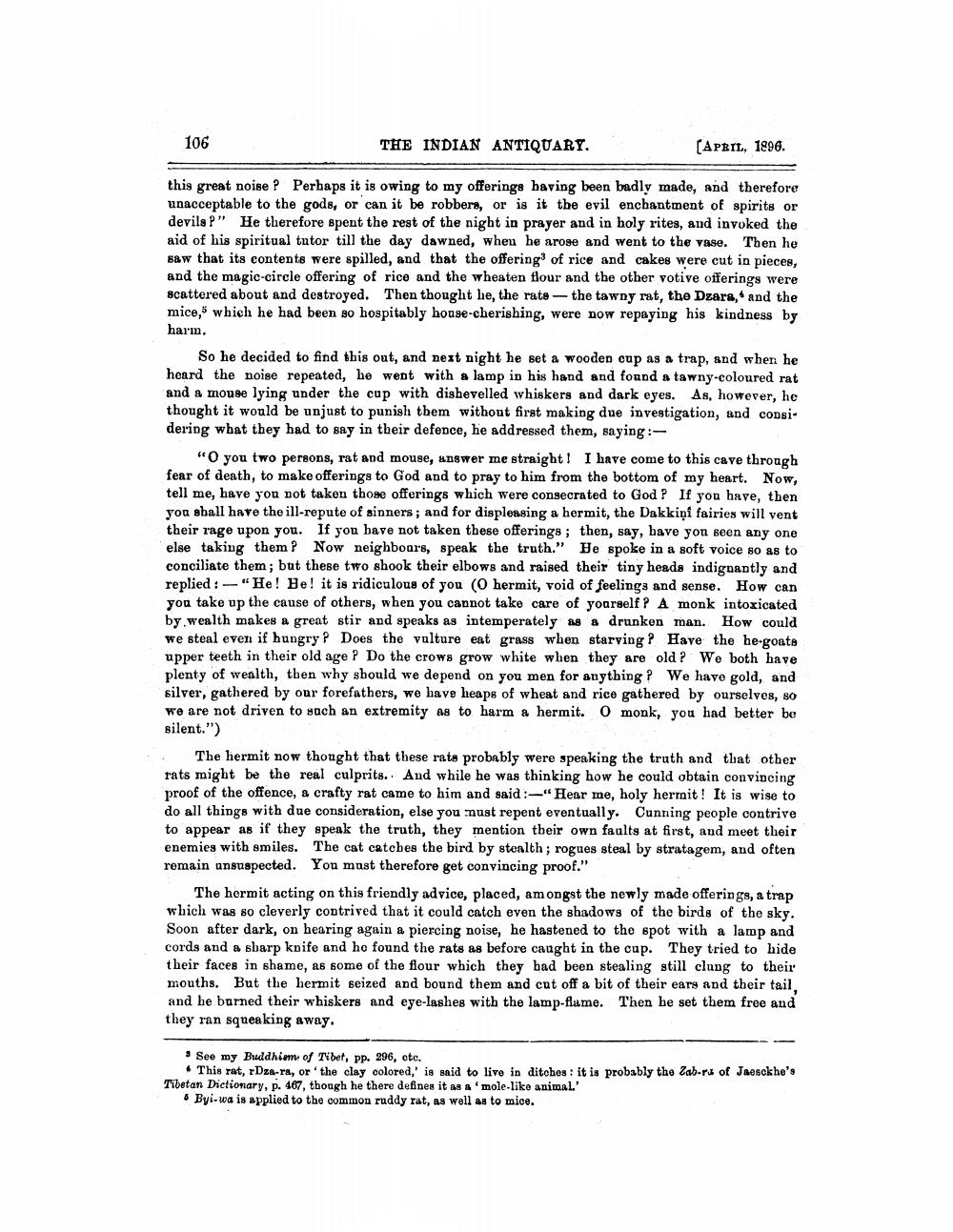________________
106
THE INDIAN ANTIQUARY.
(APRIL, 1896.
this great noise ? Perhaps it is owing to my offerings having been badly made, and therefore unacceptable to the gods, or can it be robbers, or is it the evil enchantment of spirits or devils ?" He therefore spent the rest of the night in prayer and in holy rites, and invoked the aid of his spiritual tutor till the day dawned, when he arose and went to the vase. Then he saw that its contents were spilled, and that the offering of rice and cakes were cut in pieces, and the magic-circle offering of rice and the wheaten flour and the other votive offerings were scattered about and destroyed. Then thought le, the rate - the tawny rat, the Dzara, and the mice, which he had been so hospitably house-cherishing, were now repaying his kindness by harm.
So he decided to find this out, and next night be set a wooden cup as a trap, and when he heard the noise repeated, he went with a lamp in his hand and found a tawny-coloured rat and a mouse lying under the cup with dishevelled whiskers and dark eyes. As, however, he thought it would be unjust to punish them without first making due investigation, and considering what they had to say in their defence, he addressed them, saying:
"O you two persons, rat and mouse, answer me straight! I have come to this cave through fear of death, to make offerings to God and to pray to him from the bottom of my heart. Now, tell me, have you not taken those offerings which were consecrated to God? If you have, then yoa sball have the ill-repute of sinners; and for displeasing a hermit, the Dakkiņi fairies will vent their rage upon you. If you have not taken these offerings; then, say, have you seen any one else taking them ? Now neighbours, speak the truth.” He spoke in a soft voice so as to conciliate them; but these two shook their elbows and raised their tiny heads indignantly and replied: -- "He! He! it is ridiculous of you (O hermit, void of feelings and sense. How can you take up the cause of others, when you cannot take care of yourself? A monk intoxicated by.wealth makes a great stir and speaks as intemperately as a drunken man. How could we steal even if hungry? Does the vulture eat grass when starving? Have the he-goats upper teeth in their old age ? Do the crows grow white when they are old ? We both have plenty of wealth, then why should we depend on you men for anything? We have gold, and silver, gathered by our forefathers, we have heaps of wheat and rice gathered by ourselves, 80 We are not driven to each an extremity as to harm a hermit. O monk, you had better be silent.")
The hermit now thought that these rats probably were speaking the truth and that other rats might be the real culprits. And while he was thinking how he could obtain convincing proof of the offence, a crafty rat came to him and said :-"Hear me, holy herrit! It is wise to do all things with due consideration, else you must repent eventually. Cunning people contrive to appear as if they speak the truth, they mention their own faults at first, and meet their enemies with smiles. The cat catches the bird by stealth ; rogues steal by stratagem, and often remain unsuspected. Yon must therefore get convincing proof."
The hermit acting on this friendly advice, placed, amongst the newly made offerings, a trap which was so cleverly contrived that it could catch even the shadows of the birds of the sky. Soon after dark, on hearing again a piercing noise, he hastened to the spot with a lamp and cords and a sharp knife and ho found the rats as before caught in the cup. They tried to hide their faces in shame, as some of the flour which they had been stealing still clung to their mouths. But the hermit seized and bound them and cut off a bit of their ears and their tail, and he burned their whiskers and eye-lashes with the lamp-flame. Then he set them free and they ran squeaking away.
. See my Buddhism of Tibet, pp. 296, etc.
• This rat, rDze-ra, or the clay colored, is said to live in ditches: it is probably the Zab-ru of Jaesck he's Tibetan Dictionary, p. 407, though he there defines it as a 'mole-like animal.'
Byi-wa is applied to the common ruddy rat, as well as to mice.




